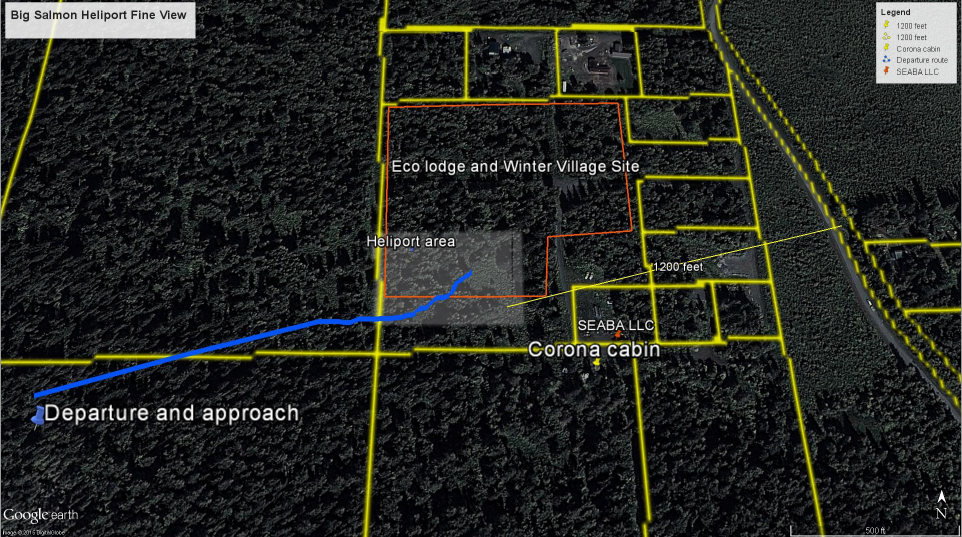
The proposed heliport site. (Haines Borough website)
A Juneau Superior Court judge recently upheld the Haines Planning Commission’s denial of a heliport permit on Chilkat Lake Road. Judge Philip Pallenberg relied partly on a much-derided noise study commissioned by the borough in 2015. He said the study, along with resident testimony, was sufficient evidence for the planners to reject the heliport.
Scott Sundberg is co-owner of Big Salmon Ventures along with a Haines heliskiing business. About a year ago, he applied for a conditional use permit to operate a heliport at his Chilkat Lake Road property.
“We would’ve never invested our time and money into this property if we felt it was going to be over-impactful, create undue noise,” Sundberg said.
But several people who live around the heliport disagreed. They experienced the impacts of helicopter activity when the borough assembly overruled a previous planning commission decision and granted Sundbeg a temporary permit the previous winter.
“Last winter, we lived with the reality of the helicopters and I have to say it was far more disturbing than I thought it was going to be,” said Shanah Kinison.
Commission chair Rob Goldberg noted that the comments they received were ‘overwhelmingly against’ the heliport. The commission rejected the permit in a 4-2 vote.
Sundberg then appealed that decision to the borough assembly. The assembly voted 4-2 against rehearing the application. That’s when Sundberg’s company, Big Salmon Ventures, went to Superior Court.
Their appeal took issue with a number of things. It said the commission did not follow the correct procedure in its vote count and official decision letter. Judge Pallenberg dismissed those arguments, though he did caution the planning commission to make a more formal record of its actions.
Pallenberg spends the most time on the question of whether there was substantial evidence to support the commission’s decision. The heliport application was denied because planners said it did not meet six of the eight criteria required for conditional use. Pallenberg focuses on the finding that the heliport would cause ‘undue noise.’
For that, the judge turns to the noise study. The borough commissioned the $40,000 study to analyze noise levels while the Chilkat Lake Road heliport was operating under its temporary permit at the beginning of 2015. The planning commissioners were just some of the people who disparaged the noise study as a waste of time and money.
“This whole study it totally flawed,” said Commissioner Lee Heinmiller. “Even if you had a degree in sound engineering you could spend four hours reading your way through this thing and it’s a total joke.”
But the study was useful when it came to Pallenberg’s decision. He referred to the consultant’s finding of ‘very loud’ helicopter noise at 94 decibels measured from a nearby residence.
Pallenberg says whether that reaches the standard of ‘undue noise’ is, without question, a subjective determination. But that’s not a deal-breaker, he says. Pallenberg reasons that permitting decisions are often made using subjective judgment.
“Many land use determinations are not susceptible to mathematical formulae,” he says.
He goes on to say that the decision of whether the heliport sound is ‘undue noise’ comes down to what sort of community Haines wants to be. And the people elect the assembly, which appoints the planning commission, to make those determinations.
Pallenberg concludes that the noise study and resident testimony provide substantial evidence in support of the commission’s decision.
Sundberg says he’s disappointed with that interpretation.
“Well all he really said was that there’s sufficient evidence that helicopters are loud,” Sundberg said. “What he didn’t take into account was that in this particular area, there’s more than just a residential zone, there’s mixed use.”
Sundberg says since the heliport is in a general use zone, he bought the property thinking it would come with few restrictions. He says certain land use decisions being left to the whims of the planning commission and assembly makes running a business in Haines difficult.
“The judge’s decision highlighted the need for fair, objective individuals being appointed to the planning commission. In any three-year span of time, something like this would go back and forth from being approved and not approved. And that’s the unfortunate situation.”
Sundberg says if the planning commission is going to limit noise in the general use zone, there should be regulations in borough code, to reign in what he calls the ‘bias’ of commissioners.
That was one outcome some wanted to see from the noise study. The hope was that the information might help the borough draw up local guidelines. But that hasn’t happened. Borough Manager Bill Seward said in his six months here, noise regulation is not something any assembly members have brought up.
Read the judge’s full decision here: Big Salmon v. Haines Borough









Tom Wayes; some people don’t like all the noise involved. You live in a nice quiet place and then have choppers making noise all day long; well its annoying as heck! If they want a heliport then build it away from people’s homes far enough to keep the peaceful environment people want.
Goldberg is far to biased against the Heli ski industry to hold a fair and honest seat on the planning commission.